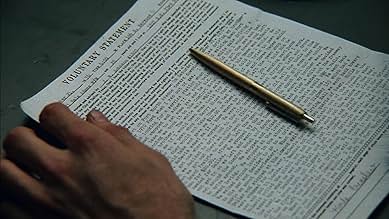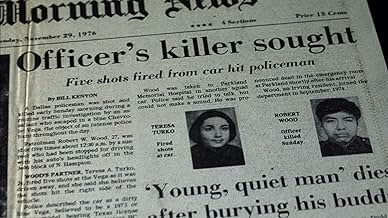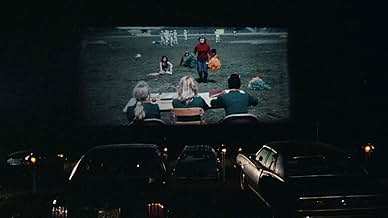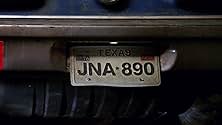NOTE IMDb
7,9/10
27 k
MA NOTE
Une histoire qui a soutenu avec succès qu'un homme avait été condamné à tort pour meurtre par un système judiciaire corrompu dans le comté de Dallas, au Texas.Une histoire qui a soutenu avec succès qu'un homme avait été condamné à tort pour meurtre par un système judiciaire corrompu dans le comté de Dallas, au Texas.Une histoire qui a soutenu avec succès qu'un homme avait été condamné à tort pour meurtre par un système judiciaire corrompu dans le comté de Dallas, au Texas.
- Réalisation
- Scénario
- Casting principal
- Récompenses
- 12 victoires et 5 nominations au total
Avis à la une
Randall Adams was a drifter who was picked up by runaway teenager David Harris when he ran out of petrol. The two men hang out for a while, drank some beer, went to the movies, smoked some weed. At this point Adams says he went his own way to his motel with his brother, watched TV and went to sleep. Alternatively, Harris says the two men stayed together were stopped by the police when Adams took out a gun and opened fire on a police officer before driving off. This film follows the court case which charged Adams for the murder of a police officer, with the underage Harris (who was ineligible for the death penalty) as one of the main witnesses against him.
I do enjoy a Perry Mason film because, after a solid hour of red herrings and question-marks, it always come down to the big reveal with Mason demanding "isn't it true? ISN'T IT?" as everyone gasps, the guilty confesses on the stand and justice is done. Sadly this is not a documentary but a basic TVM series and what the Thin Blue Line does so effectively is to get passed all our ideas of how justice works from films and presents a near-unquestionable miscarriage of justice. At no point does the "guilty" person get totally exposed (although the suggestion is very clearly there as to who it was) but instead Morris goes after the idea of reasonable doubt (which, if there is any, then the charged should not have been convicted). Starting at the very start of the fateful evening, Morris uses interviews and some reconstructions to tell the story of what happened from various points of view initially with a focus very much on the events as the courts saw it.
From here he then uses these same contributions to inject a huge amount of doubt into the vast majority of the case for the prosecution. If you want to find it, there are things in here that could be taken as anti-death penalty but for me the film is pro-justice as opposed to anti-anything as it is essentially reinforcing the importance of reasonable doubt. By virtue of doing this, everyone involved looks bad and Morris wisely doesn't need to pick on anybody in particular directly. It is fascinating as a film but I can understand the occasional claim of it being "dull" I cannot agree with it but I can understand because, in a world where excess is the norm (style, action, violence, opinion) anything that is actually restrained and even handed could be taken as "dull".
This modern moaning aside though, The Thin Blue Line is a well made film that simply and matter-of-factly condemns the justice system as it applied to Randall Adams. One of Morris' best films and worth seeking out.
I do enjoy a Perry Mason film because, after a solid hour of red herrings and question-marks, it always come down to the big reveal with Mason demanding "isn't it true? ISN'T IT?" as everyone gasps, the guilty confesses on the stand and justice is done. Sadly this is not a documentary but a basic TVM series and what the Thin Blue Line does so effectively is to get passed all our ideas of how justice works from films and presents a near-unquestionable miscarriage of justice. At no point does the "guilty" person get totally exposed (although the suggestion is very clearly there as to who it was) but instead Morris goes after the idea of reasonable doubt (which, if there is any, then the charged should not have been convicted). Starting at the very start of the fateful evening, Morris uses interviews and some reconstructions to tell the story of what happened from various points of view initially with a focus very much on the events as the courts saw it.
From here he then uses these same contributions to inject a huge amount of doubt into the vast majority of the case for the prosecution. If you want to find it, there are things in here that could be taken as anti-death penalty but for me the film is pro-justice as opposed to anti-anything as it is essentially reinforcing the importance of reasonable doubt. By virtue of doing this, everyone involved looks bad and Morris wisely doesn't need to pick on anybody in particular directly. It is fascinating as a film but I can understand the occasional claim of it being "dull" I cannot agree with it but I can understand because, in a world where excess is the norm (style, action, violence, opinion) anything that is actually restrained and even handed could be taken as "dull".
This modern moaning aside though, The Thin Blue Line is a well made film that simply and matter-of-factly condemns the justice system as it applied to Randall Adams. One of Morris' best films and worth seeking out.
Having seen two other Errol Morris documentaries, I expected that there would be a Philip Glass soundtrack, some flashy camera work, and perhaps some reenactments during 'The Thin Blue Line'. I have long struggled with my opinions on Morris' work, mainly because I am more of a purist when it comes to documentaries. I want to see footage, photographs, interviews, etc. that are going to back up a strong story, not a lot of camera angles, stark white backgrounds, and a post-modernist score.
'The Thin Blue Line' had the latter presentation, so I immediately was slightly turned off until the subject of the film was presented. The location is Dallas, and it is the 1970's. Late one night, a squad car pulls over a car that does not have its lights on, but as soon as the policeman reaches the driver's side door, he is shot several times and murdered. The car pulls away before the policeman's partner is able to ascertain the license plate number or even the exact make and model of the vehicle. What follows is a veritable witch hunt for the killer (or killers) that ends with one man in jail who is professing his innocence, and another man, a career criminal who gets away veritably scot-free. Through various interviews with the players involved; detectives, alleged eye-witnesses, the accused themselves, Morris seeks to find out the truth in a case that comes down to a 'he-said/he-said' situation.
'The Thin Blue Line' is expert film-making in the investigative sense. Morris does his job in presenting as many facts as possible. The case finally came to a head a couple of years after the film was finished, but it is documented as being instrumental in the reexamination of the facts. I still don't necessarily care for Morris' style, but it cannot be argued that 'The Thin Blue Line' is an excellent documentary, and that he definitely has an eye for picking very compelling subjects.
--Shelly
'The Thin Blue Line' had the latter presentation, so I immediately was slightly turned off until the subject of the film was presented. The location is Dallas, and it is the 1970's. Late one night, a squad car pulls over a car that does not have its lights on, but as soon as the policeman reaches the driver's side door, he is shot several times and murdered. The car pulls away before the policeman's partner is able to ascertain the license plate number or even the exact make and model of the vehicle. What follows is a veritable witch hunt for the killer (or killers) that ends with one man in jail who is professing his innocence, and another man, a career criminal who gets away veritably scot-free. Through various interviews with the players involved; detectives, alleged eye-witnesses, the accused themselves, Morris seeks to find out the truth in a case that comes down to a 'he-said/he-said' situation.
'The Thin Blue Line' is expert film-making in the investigative sense. Morris does his job in presenting as many facts as possible. The case finally came to a head a couple of years after the film was finished, but it is documented as being instrumental in the reexamination of the facts. I still don't necessarily care for Morris' style, but it cannot be argued that 'The Thin Blue Line' is an excellent documentary, and that he definitely has an eye for picking very compelling subjects.
--Shelly
The last few years have been a golden age for documentaries. For better or worse, Michael Moore and his undeniable ability for manipulating the cinematic medium have brought this endangered genre into theaters and living rooms across the country. Most of today's casual moviegoers are relatively new to the non-fiction feature. In the case of director Errol Morris' The Thin Blue Line (1988), one film not only managed to free an innocent man from a lifetime in prison, but it also elicited a confession from the guilty party. After collecting dust on video shelves for over fifteen years, this groundbreaking documentary has finally arrived on DVD.
Unless you're a devout cinephile or a video store clerk, you have probably never heard much about Errol Morris. As a member of the former category, I've been a fan of his since first renting The Thin Blue Line more than a decade ago. As I popped in that dusty VHS cassette and sat back, I relished what many critics and documentary purists had been hotly debating: Morris was taking the genre to exciting new places, whether people liked it or not.
As with all successful movies, a good doc needs a good story. In 1976, Dallas County police officer Robert Wood and his partner were patrolling their district late one night. The two pulled a blue car over to the side of the road, most likely to warn the driver of a busted taillight. Moments later Officer Wood was lying on the ground, fatally wounded by a series of gunshots. His partner quickly ran to his aid, but was unable to accurately retain and recall certain information about the killer's vehicle. Was it a Vega or a Comet? Did the driver have bushy hair or a fur-lined collar? These and many other questions emerged during the rushed investigation to bring the mysterious cop-killer to justice.
The film itself opens more than ten years after the murder took place. Randall Adams, an oddly charismatic good ol' boy sits before the camera, revealing what happened that unfortunate evening in late 1976. He admits to having shared a ride with a young kid named David Harris. The two apparently attended a drive-in double feature, where they both drank beer and smoked marijuana. Shortly thereafter, Adams claims to have been dropped off at his motel for the evening. Meanwhile, Morris shows us the aforementioned David Harris, now in his mid-20s, talking cryptically about that night's events. This real-life Rashomon confronts viewers with several versions of "the truth." It's unclear whether Morris instinctively knew the truth was still out there when he decided to pursue this project, but his previous experience as a private investigator seems to have paid off as we witness his off- camera interrogation of these two men.
Adams, responsible or not, was determined guilty by the courts and sentenced to death. Despite having a police record as long as his shadow, David Harris became the primary witness against Adams in the case. His testimony alone might not have hung Adams, but at the last minute a trio of eyewitnesses to the crime emerged to corroborate his story. In the world of Errol Morris, people are a truly strange lot, and his greatest technique is to simply let his subjects talk and talk until their inherent weirdness becomes painfully evident. Such is the case with the three last-minute witnesses in the Adams case. The more we hear them speak, the greater that uneasy feeling in our stomach and chest becomes. We are bearing witness to a catastrophic miscarriage of justice.
Morris employs a bottomless bag of tricks in this landmark film. While much of the film does rely on the presence of talking heads, he adds other elements to the mix, such as old movie footage, a haunting score by renowned composer Philip Glass, and the granddaddy of documentary no-no's: dramatic re-enactments. The latter tends to be the most challenged aspect of The Thin Blue Line, but Morris uses it fairly and wisely. He tells this twisted tale in ways few people could. A shot of a swaying timepiece or a concession stand popcorn machine suddenly amount to much more than what we're simply seeing on the screen. All of these pieces are being put together, little by little, in the hopes that by the end we will see the bigger picture.
When this movie was released in 1988, it was marketed as a non-fiction film, because the word "documentary" was thought to scare off ticket-buyers. The studio's attempts to pass it off as a murder mystery failed, but the movie made a minor splash once it hit video. It picked up plenty of awards from festivals and critics groups, but the Oscars didn't even bother nominating it. In fact, the Academy didn't so much as nod in Morris' direction until early 2004, when they nominated The Fog of War, his powerful, relevant look at former U.S. Secretary of Defense, Robert McNamara. That film and Morris' two previous masterpieces, Mr. Death and Fast, Cheap & Out of Control have been available on DVD for some time. His first three films, Gates of Heaven, Vernon, Florida, and The Thin Blue Line, were recently made available either individually or in a 3-disc box set. All six of these films are unique, intriguing portals into Mr. Morris' strange universe, which is not so distant from our own. If it's dramatic situations, reality TV, or simply a great movie that you want, look no further than The Thin Blue Line. As one of the greatest documentaries of our time, it is all these things and so much more.
Rating: A
Unless you're a devout cinephile or a video store clerk, you have probably never heard much about Errol Morris. As a member of the former category, I've been a fan of his since first renting The Thin Blue Line more than a decade ago. As I popped in that dusty VHS cassette and sat back, I relished what many critics and documentary purists had been hotly debating: Morris was taking the genre to exciting new places, whether people liked it or not.
As with all successful movies, a good doc needs a good story. In 1976, Dallas County police officer Robert Wood and his partner were patrolling their district late one night. The two pulled a blue car over to the side of the road, most likely to warn the driver of a busted taillight. Moments later Officer Wood was lying on the ground, fatally wounded by a series of gunshots. His partner quickly ran to his aid, but was unable to accurately retain and recall certain information about the killer's vehicle. Was it a Vega or a Comet? Did the driver have bushy hair or a fur-lined collar? These and many other questions emerged during the rushed investigation to bring the mysterious cop-killer to justice.
The film itself opens more than ten years after the murder took place. Randall Adams, an oddly charismatic good ol' boy sits before the camera, revealing what happened that unfortunate evening in late 1976. He admits to having shared a ride with a young kid named David Harris. The two apparently attended a drive-in double feature, where they both drank beer and smoked marijuana. Shortly thereafter, Adams claims to have been dropped off at his motel for the evening. Meanwhile, Morris shows us the aforementioned David Harris, now in his mid-20s, talking cryptically about that night's events. This real-life Rashomon confronts viewers with several versions of "the truth." It's unclear whether Morris instinctively knew the truth was still out there when he decided to pursue this project, but his previous experience as a private investigator seems to have paid off as we witness his off- camera interrogation of these two men.
Adams, responsible or not, was determined guilty by the courts and sentenced to death. Despite having a police record as long as his shadow, David Harris became the primary witness against Adams in the case. His testimony alone might not have hung Adams, but at the last minute a trio of eyewitnesses to the crime emerged to corroborate his story. In the world of Errol Morris, people are a truly strange lot, and his greatest technique is to simply let his subjects talk and talk until their inherent weirdness becomes painfully evident. Such is the case with the three last-minute witnesses in the Adams case. The more we hear them speak, the greater that uneasy feeling in our stomach and chest becomes. We are bearing witness to a catastrophic miscarriage of justice.
Morris employs a bottomless bag of tricks in this landmark film. While much of the film does rely on the presence of talking heads, he adds other elements to the mix, such as old movie footage, a haunting score by renowned composer Philip Glass, and the granddaddy of documentary no-no's: dramatic re-enactments. The latter tends to be the most challenged aspect of The Thin Blue Line, but Morris uses it fairly and wisely. He tells this twisted tale in ways few people could. A shot of a swaying timepiece or a concession stand popcorn machine suddenly amount to much more than what we're simply seeing on the screen. All of these pieces are being put together, little by little, in the hopes that by the end we will see the bigger picture.
When this movie was released in 1988, it was marketed as a non-fiction film, because the word "documentary" was thought to scare off ticket-buyers. The studio's attempts to pass it off as a murder mystery failed, but the movie made a minor splash once it hit video. It picked up plenty of awards from festivals and critics groups, but the Oscars didn't even bother nominating it. In fact, the Academy didn't so much as nod in Morris' direction until early 2004, when they nominated The Fog of War, his powerful, relevant look at former U.S. Secretary of Defense, Robert McNamara. That film and Morris' two previous masterpieces, Mr. Death and Fast, Cheap & Out of Control have been available on DVD for some time. His first three films, Gates of Heaven, Vernon, Florida, and The Thin Blue Line, were recently made available either individually or in a 3-disc box set. All six of these films are unique, intriguing portals into Mr. Morris' strange universe, which is not so distant from our own. If it's dramatic situations, reality TV, or simply a great movie that you want, look no further than The Thin Blue Line. As one of the greatest documentaries of our time, it is all these things and so much more.
Rating: A
A film that successfully argued that a man (Randall Dale Adams) was wrongly convicted for murder by a corrupt justice system in Dallas County, Texas.
Morris was originally going to film a documentary about prosecution psychiatrist, Dr. James Grigson, known as Doctor Death, who testified in more than 100 trials that resulted in death sentences. In almost every instance, Dr. Grigson would, after examining a defendant, testify that he had found the individual in question to be an incurable sociopath, who it was "one hundred per cent certain" would kill again.
This lead Morris to find an example, Adams, where this "incurable sociopath" status was in doubt. But we also still have that critique of Grigson -- we see what he said about Adams, a man with no history of criminal acts or violence, after only fifteen minutes with him.
This change in focus lead to a better film, most likely (though Erroll Morris has an incredible track record for good documentaries). We now get to see a wider picture of eyewitness testimony, the prejudice of the area (which includes a thriving KKK) and more.
Adams' case was reviewed and he was released from prison approximately a year after the film's release. Now that is the sign of a powerful film, and what makes documentaries so great.
Morris was originally going to film a documentary about prosecution psychiatrist, Dr. James Grigson, known as Doctor Death, who testified in more than 100 trials that resulted in death sentences. In almost every instance, Dr. Grigson would, after examining a defendant, testify that he had found the individual in question to be an incurable sociopath, who it was "one hundred per cent certain" would kill again.
This lead Morris to find an example, Adams, where this "incurable sociopath" status was in doubt. But we also still have that critique of Grigson -- we see what he said about Adams, a man with no history of criminal acts or violence, after only fifteen minutes with him.
This change in focus lead to a better film, most likely (though Erroll Morris has an incredible track record for good documentaries). We now get to see a wider picture of eyewitness testimony, the prejudice of the area (which includes a thriving KKK) and more.
Adams' case was reviewed and he was released from prison approximately a year after the film's release. Now that is the sign of a powerful film, and what makes documentaries so great.
And thus, Dallas County, Texas, in 1977, successfully prosecuted Randall Dale Adams, a lowly hitchhiker, for a crime Adams did not commit.
Adams was convicted and sentenced to death for the 1976 murder of a Dallas cop. "The Thin Blue Line", by Errol Morris, is a documentary that recounts this infamous case, by way of interviews and reenactments. It's the story of a terrible injustice, one that almost cost an innocent man his life.
What is so frightening is the fervor of Dallas officials to inflict the death penalty on someone ... anyone ... They weren't about to let the cop murder go unpunished. Adams was the most convenient target. Eventually, the truth would come out. But Adams would spend twelve years in prison, some of those years on death row. After his release, Adams never received any monetary compensation, or even an apology, from the State Of Texas, for that injustice. Interestingly, more than one Dallas County official associated with the Adams case was also associated with the aftermath of the JFK assassination, thirteen years earlier.
Morris' documentary would have been easier to follow had it had subtitles, to indicate the name of the person being interviewed. Also, some of the film's material consisted of irrelevant flashback footage and repetitive reenactments. Further, the narrative presentation was at times confusing. Nevertheless, the main issue here is the powerful true-life story.
If you can get around the technical weaknesses of this film, "The Thin Blue Line" is a gripping documentary about a real life case of American injustice, in a city that is notorious for its history of botched criminal investigations.
Adams was convicted and sentenced to death for the 1976 murder of a Dallas cop. "The Thin Blue Line", by Errol Morris, is a documentary that recounts this infamous case, by way of interviews and reenactments. It's the story of a terrible injustice, one that almost cost an innocent man his life.
What is so frightening is the fervor of Dallas officials to inflict the death penalty on someone ... anyone ... They weren't about to let the cop murder go unpunished. Adams was the most convenient target. Eventually, the truth would come out. But Adams would spend twelve years in prison, some of those years on death row. After his release, Adams never received any monetary compensation, or even an apology, from the State Of Texas, for that injustice. Interestingly, more than one Dallas County official associated with the Adams case was also associated with the aftermath of the JFK assassination, thirteen years earlier.
Morris' documentary would have been easier to follow had it had subtitles, to indicate the name of the person being interviewed. Also, some of the film's material consisted of irrelevant flashback footage and repetitive reenactments. Further, the narrative presentation was at times confusing. Nevertheless, the main issue here is the powerful true-life story.
If you can get around the technical weaknesses of this film, "The Thin Blue Line" is a gripping documentary about a real life case of American injustice, in a city that is notorious for its history of botched criminal investigations.
Le saviez-vous
- AnecdotesErrol Morris spent 2-1/2 years tracking down the various players in the Randall Adams case and convincing them to appear in the film.
- GaffesDavid Harris talks about his older brother drowning at the age of four in 1963. He says it occurred "right after President Kennedy was assassinated I believe. Sometime right after that. During the summer". However Kennedy was killed in the third week of November, well after summer.
- Citations
Melvyn Carson Bruder: Prosecutors in Dallas have said for years - any prosecutor can convict a guilty man. It takes a great prosecutor to convict an innocent man.
- Crédits fousDrawings from the Bender Visual Motor Gestalt Test © 1946, American Orthopsychiatric Association Inc. and Lauretta Bender, M.D.
Meilleurs choix
Connectez-vous pour évaluer et suivre la liste de favoris afin de recevoir des recommandations personnalisées
- How long is The Thin Blue Line?Alimenté par Alexa
Détails
Box-office
- Montant brut aux États-Unis et au Canada
- 1 209 846 $US
- Week-end de sortie aux États-Unis et au Canada
- 17 814 $US
- 28 août 1988
- Montant brut mondial
- 1 209 846 $US
- Durée1 heure 41 minutes
- Couleur
- Mixage
- Rapport de forme
- 1.85 : 1
Contribuer à cette page
Suggérer une modification ou ajouter du contenu manquant

Lacune principale
By what name was Le dossier Adams (1988) officially released in India in English?
Répondre




































